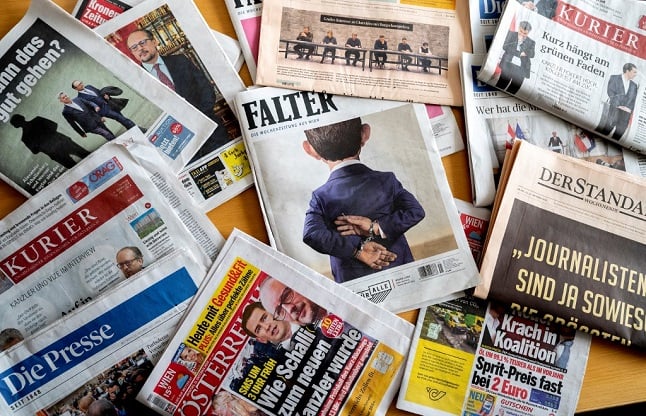When we think about countries where there are issues with press freedom, it’s usually the places that are war zones or dictatorships that come to mind. So the fact that Austria ranks only 32nd in the latest Reporters Without Borders (RSF) press freedom index may seem surprising to many people.
This is the country’s worst result to date, as it slipped from the 29th position it held last year. In 2024, Austria ranks in the middle of the countries classified as “satisfactory,” behind Moldova and ahead of Mauritania. Only eight countries are rated as having a “good” situation. The 22nd edition of the Press Freedom Index covers 180 countries worldwide.
According to Fritz Hausjell, President of RSF Austria, there are many reasons why Austria has fallen behind. The judiciary is investigating “highly problematic close relationships and suspected corrupt practices between the governing party ÖVP and several major media outlets”, he said, according to an ORF report. In addition, the judiciary is investigating the far-right FPÖ’s role in possible advertising corruption.
“In Austria, press freedom has been undermined by various political pressures or restrictions on access to information. Violence at public events prevented journalists from reporting freely”, RSF said.
READ ALSO: How Austria has tightened laws to prevent political corruption
Small market and political influences
“With just a dozen major outlets, the media market is small and very concentrated”, according to the RSF report. Additionally, tabloids have the largest readership, and there have been many attempts to influence both state and privately-owned media, with RSF calling the practice “constant”.
“Some politicians are suspected of having used public funds to buy favourable coverage in the tabloid media, while others have tried to intervene by directly going to editorial offices, such as former Chancellor Sebastian Kurz. He was forced to resign in 2021 due to suspicions of buying positive coverage in a privately owned newspaper. Journalists are sometimes the targets of political attacks coming from the extremes”, the report stated.
There have been significant scandals after corruption allegations between politicians and the media.
Most recently, prosecutors said an investigation into several former government members for alleged bribery, corruption, and breach of trust was opened in mid-April. Herbert Kickl, the hardline leader of Austria’s right-wing Freedom Party (FPOe)—currently leading polls ahead of elections expected in September—is suspected of commissioning adverts and paying for them with public money.
READ ALSO: The Kurz corruption scandal exposes Austria’s press freedom problems
In late 2021, a major media graft scandal erupted in the Alpine country. Austria’s former Chancellor Sebastian Kurz and his inner circle were accused of using public funds to pay for polls skewed to boost his image on Austrian tabloid media. It eventually led to Kurz’s resignation and exit from politics.
Of course, one of the country’s most infamous political scandals, the so-called Ibizagate that blew up in 2019, also shows Austrian leaders’ and major media’s murky underground connections. At the time, a leaked video showed then FPÖ leader and vice-chancellor Heinz-Christian Strache in a 2017 meeting on the Spanish resort island of Ibiza with a woman posing as the niece of a Russian oligarch.
Among the many controversial statements, Strache was filmed discussing the possibility of the woman buying Austria’s most-read tabloid, Kronen Zeitung, and making its editorial line more pro-FPOe.
READ MORE: ‘Ibizagate’ – What you need to know about the Austrian political corruption scandal
But it’s not just the tabloid media that has shrouded connections to those in power. In 2022, two prominent Austrian journalists, editors of reputed media such as Die Presse and ORF, had to resign over leaked chats between them and politicians. The chats showed discussions over appointments with the public broadcaster ORF and friendly notes with “inappropriate closeness” between them and political leaders.
Outdated legal framework and harassment
Although various bills are being discussed, Austria is the last EU member state without a freedom of information law. Journalists are, moreover, concerned about certain political parties’ attempts to restrict their access to judicial information.
Journalists are also harassed by various interest groups and societal movements. They are liable to censor themselves as a result of online attacks based on their gender, social class, ethnicity or religion.
After the COVID-19 pandemic, the war between Russia and Ukraine has become an issue that is polarising Austrian society and encouraging people to question journalism, the report highlighted.
READ ALSO: ‘Reforms needed urgently’ – Is Austria becoming more corrupt?
Additionally, reporters’ coverage of protests is facing significant obstruction by police, who use frequent identity checks to harass them and threaten legal action. Women journalists are particularly at risk. Newsrooms often receive threatening letters and messages, according to the report.



 Please whitelist us to continue reading.
Please whitelist us to continue reading.
Member comments